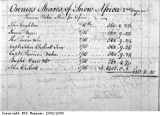Bristol slave traders and the trade
Because of the high costs involved, most slaving voyages were organised as partnerships of four to six merchants, including the ship owner. A group of investors could raise the money more easily than a single person, and also spread the risk of failure. One of the more important members of this group would be called the ‘agent’ or the ‘ship’s husband’, who was the main slave trader.
The agent, or ‘ship’s husband’, managed the voyage. He bought the trade goods and fitted out the ship. He also kept in touch by letter with the ship’s captain to ensure the voyage was conducted according to the owners’ wishes. They would also write to the slave traders in West Africa about the price and supply of slaves. The Bristol slave trader, Thomas Jones, for example, personally corresponded with one such trader in Africa. He was known by the nick-name, Duke Ephraim, and came from Old Calabar in Nigeria, West Africa. He was one of the main slave traders in the area. Duke Ephraim and Thomas Jones discussed the price and supply of slaves.
The agent also wrote to slave factors, who sold the slaves on behalf of the slave traders, in the Caribbean and North America. In his letter the agent would tell them on what terms his captain would be selling the slaves and buying plantation produce, such as tobacco and sugar. Some slave traders, like Edmund Saunders from Bristol, started out as captains of slave ships until they could make enough money to become investors in a slaving voyage and share the profits of the trade.
Pictured here is another extract from the accounts book of the ship the Africa, for the two slaving voyages in 1774 and 1776. The first voyage had eight owners with equal shares. On the second voyage, there were seven owners and eight shares. Five of them held a one-eighth share, Bright Davis & Co held a one-sixteenth share and the merchant John Chilcott held the remaining five-sixteenths. The ship was engaged in a fight with an American privateer. During the American War of Independence fought against Britain (1775-1783), American and British ships were given official approval to raid enemy ships. This type of ship is called a privateer. The Bristol ship the Africa was blown up off the coast of Portugal on its way to West Africa. The owners probably recovered their money through the insurance.



